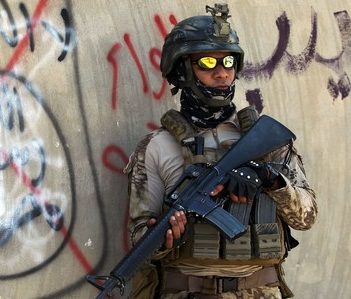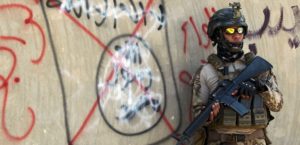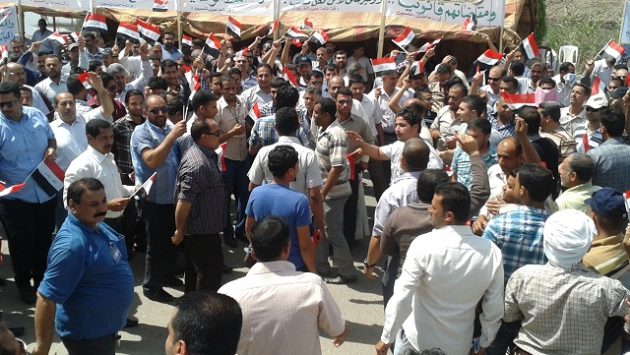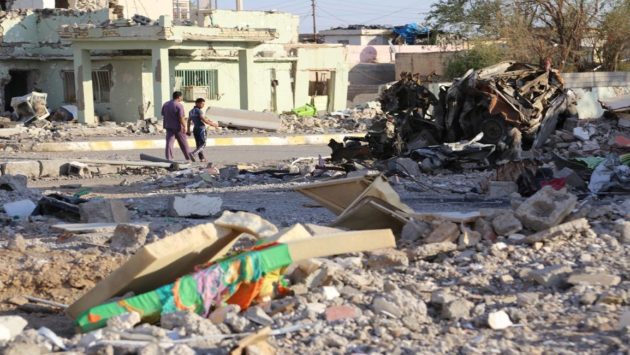Pledge Your Allegiance: Iraqi Policemen Who ‘Repented’ To Extremists, Not Allowed To Return Home
An Iraqi soldier in Fallujah stands next to IS group graffiti that has been crossed out. (photo: احمد الربيعي)
Kamal al-Ayash : Niqash
The Islamic State forced Anbar’s policemen to repent. Now those men want to return home – but the government won’t let them, saying they are deserters who may have sided with extremists.
There have been plenty of calls for families who were displaced by the security crisis caused by the Islamic State group to return home, once their territories have been cleared of the extremists. But in the central province of Anbar, it seems that not everybody is welcome.
“In June 2014 I decided to go and declare my repentance [for my former job],” says Jamal al-Mohammedi, 45, who used to work as a policeman in Fallujah before the Islamic State, or IS, group took control of his city. “The IS group had asked me to come and do this through one of my relatives, who joined the organisation. He told me I needed to go and say that I repented because the group was planning to blow up my house. He also sent me some pictures that had improvised explosive devices around the homes of my brother-in-law and my father.”
The IS group gave many members of security forces in the towns and cities they took over the same command: Repent or die, they were told.
In the end, IS fighters blew up his home. Despite this, he is still not allowed back into Fallujah, even to see what remains of his belongings.
Seeing no other choice, al-Mohammedi did as he was told. He went to the Hadra al-Muhammadiyah mosque in the city centre and spoke to the masked men at the door, telling them he wished to repent.
“I was taken to a person named al-Haji who asked me a number of questions, including about my name, family, tribe and work place,” al-Mohammedi continued. “Then I put my hand on the Koran and repeated what they told me to. I can’t remember the exact wording but basically it said that I repented and that I would not work with any government entity in the future. They held me for two days and I gave them my personal weapon and my military ID.”
Despite the fact that al-Mohammedi did this unwillingly, he is now seen as a deserter who obeyed the rules of the IS group, rather than someone who did his duty. And he is not welcome back in Fallujah.
A source in local security told NIQASH that documents found by the security forces who pushed the IS group out of Fallujah confirm that there were more than 60,000 “persons of interest” in Anbar, noted by the IS group. This included former police officers or military men. Around 20,000 of these people declared their repentance.
The same source says that about 5,000 of those who repented – mostly from within the ranks of Fallujah’s police force – were blocked from returning to Fallujah.
Al-Mohammedi says this is completely unfair. “Those who made these decisions haven’t considered the kinds of sacrifices we have made since 2007,” the former policeman says. “Today they are punishing us for doing something we did to protect our families and our property. They may not want us back in the police force but we should still be allowed to return to our homes with dignity. They shouldn’t punish us like this.”
Watheq al-Jumaili tells a similar story. The 38-year-old had actually resigned from his job with the Iraqi Ministry of the Interior in 2013, long before the IS group took over Fallujah. Nonetheless the IS group asked him to hand over his weapon and his military ID and to declare his repentance. He couldn’t hand over the first two as he had given these back to the Iraqi government already. But he could repent.
“But they still were not convinced I was genuine,” al-Jumaili says. And in the end, IS fighters blew up his home. Despite this, al-Jumaili says he is not allowed back into Fallujah even to see what remains of his belongings.
“We heard a lot about procedures to allow people to return home,” he told NIQASH. “But on the ground, there doesn’t seem to be much going on. It seems as though all these procedures are really just to allow some people to return – those who are supported by their tribes and other influential people.”
Even those security staffers who didn’t repent have had problems. Ammar Jouriyeh used to work for anti-terrorism forces inside Fallujah. He refused to repent even though the IS group threatened him several times. In the end, he was forced to leave the city.
“I still have my weapon and ammunition though,” he boasted. “I buried them in my garden before I left town.”
Jouriyeh was able to re-join some pro-government forces in the nearby district of Habbaniyah. “But then we found out that the government had stopped paying our salaries. So we returned to Fallujah, picked up our families and took them to Baghdad,” the 41-year-old says. “It was a very difficult journey.”
Unfortunately for him, after Jouriyeh left, the IS group began using his home as one of their bases in the city. Many locals thought this meant he was cooperating with the IS group and his name is on a black list now; he too is not allowed back into his hometown.
Politicians are aware of this issue and say they are doing their best to resolve it.
MP Mohammed al-Karbouli, a member of the Iraqi Parliament’s Security and Defence Committee, told NIQASH that authorities recognized that there were two kinds of repenters. There were those who repented and then became active members of the IS group, and those who simply saw no other choice and were trying to protect themselves and others.
The former group will not be allowed to return home, al-Karbouli said. For the latter, we are trying to do our best to help them get home.
“The fact that they fled doesn’t mean they are weak or that they deserted,” al-Karbouli argues. “They were driven out by the brutality of the enemy and their superior manpower and weaponry. Policemen who only have light weapons can’t confront an enemy like that.”
“We have held a number of meetings to try and work out how to ensure only the last group are able to return,” al-Karbouli says. “But it is a difficult and complicated matter and requires agreements between politicians and security forces.”
Efforts are now being made by tribal groups to try and get the government’s permission for around 4,000 of the guilt-less repenters to return home to Fallujah. It is seen as a positive step by men like Jouriyeh and al-Mohammedi, but they worry that the procedure is too informal at the moment. Those who return fear they could be prosecuted later on.
“These informal procedures are useless,” Rajeh al-Issawi, a local politician who heads Anbar’s provincial security committee, told NIQASH. “Because although the repenters are allowed to return home, their names are not deleted from the computerized list of wanted persons. So legally speaking, they could be arrested at any moment. For the time being we are adopting a plan that would allow everyone to return home with their families. We will check their names later on. Where there is evidence that a person joined the IS group, they will be arrested.”





